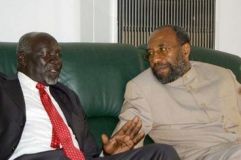Juba talks – Uganda threatens to walk out over harsh rebel rhetoric
July 15, 2006 (JUBA) — Juba Peace talks aimed at ending Uganda’s brutal Lord’s Resistance Army (LRA) insurgency hit a snag on Saturday as the government threatened to walk out over harsh rebel rhetoric, officials said.
 Just a day after the ceremonial opening of the historic negotiations here, southern Sudanese mediators were attempting to salvage plans to bring the two sides together for the launch of detailed discussions, they said.
Just a day after the ceremonial opening of the historic negotiations here, southern Sudanese mediators were attempting to salvage plans to bring the two sides together for the launch of detailed discussions, they said.
Kampala’s delegation complained that the LRA had been too “combative” in its opening statement on Friday when the rebels vowed to continue their 19-year war in northern Uganda unless all their grievances were addressed.
“We are very concerned about the combative mood of the LRA delegation,” said Paddy Ankunda, the spokesman for the Ugandan team. “That mood is not good for peace talks.
“We told them that we cannot continue with that combative mood,” he said, adding that Uganda’s lead negotiator, Interior Minister Ruhakana Rugunda, was meeting with mediators to unblock the stalemate.
“We are ready to compromise because we know who they are,” Akunda said.
Officials with the autonomous government of southern Sudan who are hosting and mediating the talks could not immediately be reached for comment.
The spokesman for the LRA delegation, Obonyo Olweny, however, said the rebels had not been told of Kampala’s complaint and defended the opening statement, maintaining it was an honest and serious appraisal of the situation.
“I am not aware of the government position,” he told reporters, confirming though that Saturday’s expected resumption of the talks had not yet occurred. “We are waiting for mediators to call us within the working hours of the day.”
Olweny, who delivered the rebel’s position on Friday, denied it had been overly harsh and reaffirmed the LRA’s commitment to reaching a negotiated solution to the long-running conflict.
“I don’t think it was combative, it was realistic,” he said. “What we gave was a realistic statement. Maybe the government underestimates the seriousness of these peace talks.”
Olweny surprised many attending the opening ceremony by accusing Ugandan President Yoweri Museveni of corruption and warning the LRA had not agreed to the peace talks because it was “militarily weak.”
“If Uganda believes they can settle this on the battlefield, they are in for a rude shock,” he said.
Tens of thousands of people have been killed and some two million displaced in northern Uganda since the LRA took leadership of a regional rebellion among the Acholi ethnic minority in 1988, in a bid to oust Museveni.
The talks in the southern Sudan capital of Juba are seen by many as the best chance to end the war, which is regularly described by aid agencies as one of the world’s worst and most forgotten humanitarian crises.
The negotiations had been due to start on Wednesday but were delayed for 48 hours as chief mediator Riek Machar, the vice president of south Sudan, unsuccessfully attempted to convince the LRA to send its top leaders.
Uganda had wanted elusive rebel supremo Joseph Kony, his deputy, Vincent Otti, or one of three other LRA commanders wanted for war crimes by the International Criminal Court (ICC) to attend.
Kampala said only the most senior leaders had the power to negotiate on the LRA’s behalf.
But the rebels rebuffed the appeal, with Otti telling Machar it was too dangerous for the senior leadership to participate, mainly because of ICC international arrest warrants out for them.
Museveni has offered Kony and the others “total amnesty” should the peace talks produce a settlement but the ICC says the war crimes charges and arrest warrants remain in force.
Kony, a self-proclaimed prophet and mystic who claims to speak directly to God, purports to be fighting to replace Museveni’s government with one based on the Biblical 10 Commandments.
(ST)
